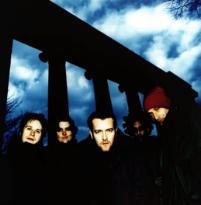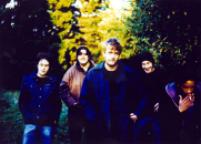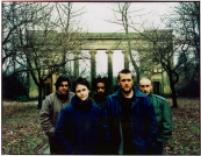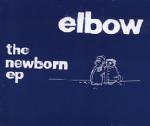
http://www.kindamuzik.net
ernaast
Onze laatste liverecensie.
Onze laatste albumrecensie.
Ons laatste interview.
Onze laatste video.
Elbow
"For every romantic sentiment that I put in a song, I also throw in a bit of gritty realism." Don't call them the new Radiohead. Forget those "bedwetters" Coldplay. ELBOW are ready to shoulder their way (albeit gently) into your subsconsciousness. Hot on the heels of their achingly beautiful debut epic 'Asleep in the Back' ELBOW's singer Guy Garvey and bassist Pete Turner sit down to talk about friendship and music, narrow-minded towns, and record label courtesy. But the question eerily remains: Can the French breakdance?
Tekst: Alex Tobin
Publicatiedatum: 06 mei 2001
 You've all known each other for a long time now. How important is that relationship with each
other when it comes to making music together?
You've all known each other for a long time now. How important is that relationship with each
other when it comes to making music together?
GG: "You can almost predict who's going to like what, because we all write. Even though
the band has been traditionally marketed, i.e. I'm stood at the front on the photographs, all five of
us are responsible, and if one of us is missing it wouldn't work any more. There's a very bizarre
symbiosis that's built up. We've jammed with other people. Andy, the drummer from I Am Kloot, came
down to the rehearsal room one day when Jupp couldn't show, and he just said: "Well, I'll have a bash
if you want." It was so hard and completely different. That's because we've never played with anyone
else."
Do you all listen to and discover the same music as well?
GG: "Well, Pete and I used to live together. We lived together for about four and a half,
five years in total. No, there's common ground musically, things we all appreciate. A lot of the time
when we're on the road you maybe get something that we all experience for the first time. The
diversity of influences is perhaps what keeps it moving, and that's probably responsible for quite an
eclectic record."
 You grew up as outsiders of a sort in a somewhat narrow-minded town, Bury. Did that also create a
special bond between all of you?
You grew up as outsiders of a sort in a somewhat narrow-minded town, Bury. Did that also create a
special bond between all of you?
GG: "Yeah, I think so. Having said that, there are a lot of people that we got along with
in Bury. The problem with Bury is not really its people. It's more the attitude that the council have
towards Bury's people and the shit that people stand for. If it's anything to do with the residents
of the town, it's to do with their tolerance of having the fucking piss taken all of the time from
the council. So, maybe not because people were narrow-minded, but because people said: "You can't do
that for a living. You're not being realistic." You tend to tighten the ranks a little bit, in order
to keep going. We used to rehearse in a carpeted room in a disused mill."
PT: "Horrible place. I still dream about that place."
GG: "Yeah, I do as well. No windows... There's never anything good going on in that room,
and it's like you were hidden away in one of the worst places. You'd end up being like the 'People
Under the Stairs'. That's how you feel, coming into the daylight, looking like albinos."
 OK, but it wasn't like the cliched suburban setting then, was it?
OK, but it wasn't like the cliched suburban setting then, was it?
GG: "Well, there is that area. Pete lived more in that area than I did. I lived in the
shithole end of town, in a real fucking slum at the worst. Mark, the guitarist, and I both used to
work there. We were working at a guitar shop for 15 pounds a day. It's just disgusting, but we robbed
the owner blind, because he was a fascist fuck."
PT: "Big Keith."
GG: "He was the ugliest man in the world, and he owned the brothel that was above the
guitar shop as well. He used to call the shop his "moral earnings". It was horrible."
 You've said before that both lyrically and musically it has to be sincere. How important is that
sincerity to you, and how important is it for you to do your own thing without having a certain label
slapped onto you?
You've said before that both lyrically and musically it has to be sincere. How important is that
sincerity to you, and how important is it for you to do your own thing without having a certain label
slapped onto you?
GG: "It's very important really. The only disagreements we've had with the record label
were choice of singles, which contractually is the only power they have. We've got complete artistic
control otherwise. The only power they do have is that they get final say on which singles get
released. The fallout became an agreement: We're going to release something which is a cross-section
of the album that's not necessarily particularly commercial, just to point to the market where the
sound is going, rather than promoting it with the more typical song structures. We're going to
actually release 'Coming Second', which is perhaps not quite as strikingly a commercial track, just
to level the playing field, just to make sure that even the way we're marketed is honest."
Is that also more representative of your sound as a whole, as opposed to what the label might
pick?
GG: "Yes. I think they'd stick to one area of the music which is what's gone before, the
stuff that sounds most similar to Radiohead or Coldplay, the tried-and-tested route. We're like: "No,
hang on. Let's play with this. Let's do this differently." Sincerity has so many benefits. Lyrically,
it gets very uncomfortable sometimes. What I never realized until recently is that people
cross-reference songs. I can make references to incredibly specific things without actually giving
anything away, but if somebody cross-references that against another song all of a sudden I've given
away something that I really didn't want to. That's the downside. The upside of doing it is when
you've got to promote the stuff, night after night. If I can close my eyes, think about when I wrote
the song, and put myself in those shoes again, it's so much easier to have the energy to perform
it."
 I can imagine that it's sometimes hard to remember the actual thought and creative process of
putting a song down onto paper when you're out on the road, in a country away from home. It must be
hard to keep that tie.
I can imagine that it's sometimes hard to remember the actual thought and creative process of
putting a song down onto paper when you're out on the road, in a country away from home. It must be
hard to keep that tie.
GG: "Yeah. Most of the songs on 'Asleep in the Back' are centred around one particular
relationship I had. My relationship with that person has changed completely now, to the point where I
don't have a lot of the feelings anymore that I did for her and about situations, which is good,
because it nearly fucking killed me. It also means that I only have to close my eyes, and I'm right
back there. Yeah, you're giving a chunk of yourself, but it means that you can do it forever. Some of
the songs on the album are five years old, but they still mean as much as they did the day we wrote
them. Lyrically, everything I write is a reaction to the music that I'm given by the rest of the
band. I'll sit down, and whatever it evokes I write down. The mood of the band is what I get first. A
lot of the songs are about our collective experiences, like 'Any Day Now', 'George Lassoes the Moon',
and to a degree 'Bitten by the Tailfly'. Now this is stuff where either an individual, two people, or
the whole band work on. It's quite a slow way of working. You squeeze them out."
Do you strive for the more complex school of writing, as people like Bob Dylan did, their texts
still being analysed many years after they were written, or do you prefer the simple,
straightforward, and direct style?
GG: "It changes from song to song. A song like 'Scattered Black and Whites' is incredibly
simple. It's literally snapshots from your childhood, positive images from a childhood. It's sung
really monotone, there's not much melody to the song. All of the music is a loop, just two chords
throughout the entire song, and what keeps it organic and flowing are the dynamics of the piano
behind it, which is quite random and quite fluid. Then you go to something like 'Bitten by the
Tailfly'. That's a series of images, but using a lot of metaphor. That kind of writing sometimes
sounds like: "Look how clever I am!" The whole point of 'Bitten by the Tailfly' is to get across how
sinister the character is. It's the metaphors that the character is using that make you think: "How
can you think like that, you twisted fucker?" Sometimes it's simple, sometimes it's a lot more
creative. It depends on what I'm trying to illustrate."
 Do you sometimes aim for a contradictory approach, as in using a lot of melody for a more downbeat
song and more monotony for a really positive story?
Do you sometimes aim for a contradictory approach, as in using a lot of melody for a more downbeat
song and more monotony for a really positive story?
GG: "Yeah. I don't like imbalance in any area of the music, because the stuff's supposed
to take you somewhere. You should be somewhere that you weren't at the end of every song. You should
be somewhere that you want to be as well. If you layer up images in people's heads, that's one way of
taking them somewhere. Sometimes you want a glimpse of something that comes straight out of the
music, and you let it do its hypnotic thing. So it depends to what end, really. I don't like
imbalance. For every romantic sentiment that I put in a song, I also throw in a bit of gritty
realism, just to make sure that everybody knows that I'm telling the fucking truth. I don't think
that I've written the words "I love you" in a song yet. I've written loads and loads of love songs,
but I don't think that I've ever even used the word "love". I try desperately to avoid the obvious.
We all do, really."
How influential are daily life in Manchester and the resulting observations on your writing, both
lyrically and musically?
PT: "I think it probably does affect things. When we were in France, it was such a
beautiful setting. It was countryside, a farming community in the middle of nowhere. It was very
beautiful at a very beautiful time of the year. Spring was just kicking in. A lot of the stuff that
we did over there was very melancholy and very peaceful. We slowed right down. We went there after
the initial buzz of signing to Island. Two weeks after signing we'd gone. I would imagine - maybe
lyrically as well, I'm not sure - that it's probably more gritty when we're working in Manchester.
The whole pace and lifestyle completely changes."
 Do you write on the road at all?
Do you write on the road at all?
PT: "At the moment we're so busy, and it's hard to get everyone together at the same time
in Manchester, so we've all got little portastudio eight-tracks. Someone will stick something down,
pass the minidisc to someone else, they'll stick something on itÉ We've got quite a lot of stuff from
that, nothing actually finished. When we've got time to go into the studio again, we'll sit through
all of these ideas that we've all got and work on them together."
GG: "It's a great way of doing it. If you leave a song unfinished until you get into the
studio, you're leaving it open to change. The organic process doesn't end with the writing being
completed. That also means that you work on it recorded in one method. Sometimes you've got a song on
your album before you've ever played it live, so you have to work on a live version. That's great,
because then people are coming to see a gig, and they're not coming for a reproduction of the
album."
It evolves in the meantime.
GG: "Absolutely!"
PT: "Like 'Coming Second' definitely did."
GG: "Yeah, once we started playing 'Coming Second' live, it really kicked off."
PT: "We knew exactly what to do with it. As soon as we recorded it in the studio, we got
into the practice room and said: "Right, let's play it how it is there, on the record." After that,
we just knew exactly where it had to go. It happened very quickly."
GG: "You can can a whole vocal line and a bass line until the last minute if you find
something better."
That must be the fun part, actually coming up and creating some stuff on the spot like that.
GG: "Definitely! I think it must be difficult if you're in a band where there are one or
two creative leaders."
PT: "I couldn't work in a band like that."
GG: "No, I couldn't either. Someone would go: "Well, the song doesn't go like that!" I
hate that phrase. If you say: "Well, why don't we do this then?" - "It doesn't go like that!" Then
fucking make it go like that! Have a go, try it. If you hang on to songs like a baby, chances are you
might drop it out of nervousness... Wow, that was a really crap metaphor! "If you hold it like a baby,
you might drop it out of nervousness." That was absolutely shocking. I was trying to do a soundbite,
I'm very sorry! Our keyboardist Craig is a right perfectionist, and he tends to be really hesitant:
"Oo, I don't know. I'm not sure." I'm the opposite. I'm incredibly lazy and very impatient, so I'm
like: "Chuck it at the wall! Chuck it at the wall!", and he's like: "Easy, y'know... Easy..."
Production-wise that balances things quite a bit. Pete never lifts a fucking finger, do you
Pete?"
PT: "I don't need to when I've got four people doing it for me! We all earn the same
money... It makes sense!"
GG: "Oh, you might witness the split-up! Actually, we've only had one argument. We worked
it out the other day. Do you know what it was about, how it started?"
 It was in France, right?
It was in France, right?
GG: "Yeah. We were saying the other day: "How did that argument start?" It started
between Pete and the guitarist. It was over whether or not the French can breakdance!"
What was the conclusion?
GG: "Of course they can't!"
PT: "Well, there wasn't a conclusion. It just went elsewhere... Suddenly we were saying:
"What's going on here?!!" It was the night we ran out of fags."
Yeah, that's definitely dropping the baby... into the fire there.
GG: "Yeah! That's dropping the baby... before it's been fed?!!"
You've had some bad luck with labels in the past. How does it feel to be sitting here, talking to
journalists, actually promoting your first proper album?
PT: "It's very good. Uncut magazine wrote something like: "Heads will roll at their old
label, Island, for letting them go.""
GG: "That's a great thing to read! We've never been motivated out of "I'll show them"
before."
PT: "When we got dropped, Guy phoned up Island and said: "It was nice working with you
while we did." We certainly don't make enemies out of these people, because you never know what's
going to happen around the corner."
GG: "Also, the way that record companies deal with acts... One day, you're planning your
tour of America, and the next day they're not returning your call. I've always hated the fact that
all of a sudden it's like you never even had a personal relationship. I know they're not going to
return my calls, so I always leave a voicemail, saying: "I've got the bad news. I'm absolutely
crushed, as you can imagine. I just wanted to say it was nice nearly working with you, and don't
avoid us. If you see we're playing locally, come and have a beer.""
Diplomat.
GG: "Absolutely."
PT: "Creep."
http://www.kindamuzik.net/artikel.php?id=376
Meer Elbow op KindaMuzik: http://www.kindamuzik.net/artiest/elbow
Meer Elbow op KindaMuzik:
» Live-recensie: Elbow» Interview: Het comfortabele succes van Elbow
» Bezoek de Elbow artiestpagina








Deel dit artikel: